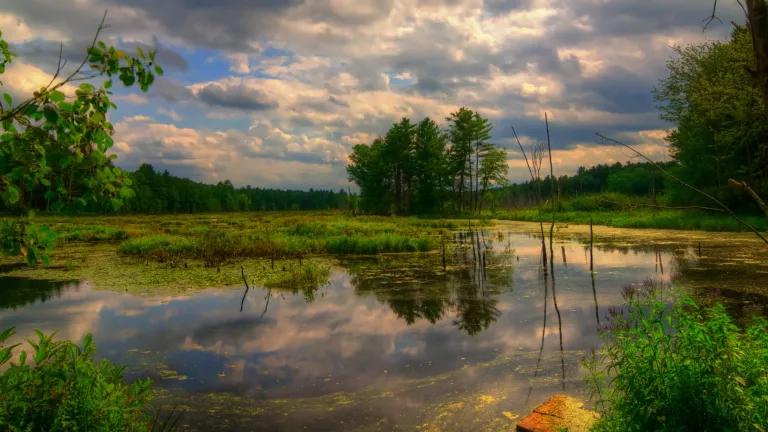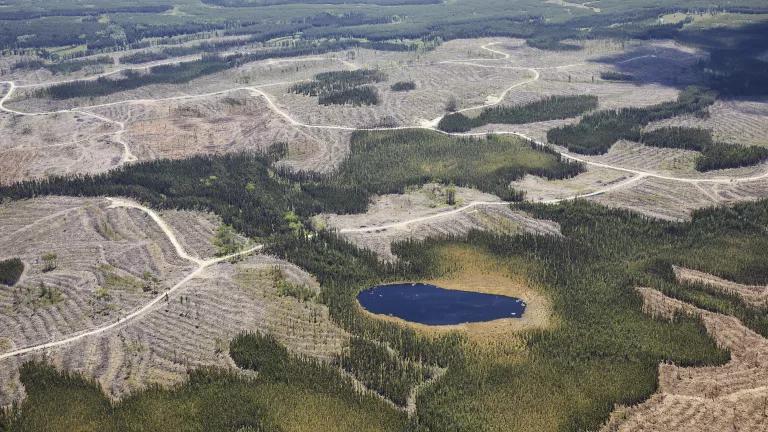Climate Report Compels Paradigm-Shifting Nature Agreement
Paradigm-shifting goals for protecting ecosystems and wildlife will give us the best chance of surviving the climate and nature crises.

Puffer Pond Assabet River
NWR Photo Credit Jay Beeler
The Intergovernmental Panel on Climate Change’s (IPCC) 2022 report on Impacts, Adaptation, and Vulnerability is critical for the Parties to the Convention on Biological Diversity (CBD), who are in the process of negotiating a global agenda for nature conservation. The report should compel the Parties to adopt audacious, paradigm-shifting goals for protecting ecosystems and wildlife to give them and us the best chance of surviving the climate and nature crises.
The scientists drafting the IPCC report gave us a clear message: Now is the time for courage and a clean break with business as usual. It’s time for transformative action. The world’s ecosystems and wildlife need us to fight for their future, so they in turn can keep providing us with the natural building blocks we need to survive. They need us to advance solutions—and there’s not a moment to waste.
The IPCC report presents a tough picture, setting the stage for the possible disappearance of humankind. It seems almost fanciful. But as the report makes clear, the real fantasy is believing we can muddle through somehow. Or, that if we try hard enough, we’ll get an “A” for effort; everything will turn out all right because what matters is giving it your best. Such sentiments aren’t based in reality and ultimately jeopardize the wellbeing of millions of people. This dynamic is playing out in real time at the CBD negotiations, where Parties often focus on what is “comfortable” instead of what is “necessary.”
Focusing on what is “comfortable” is a recipe for disaster and must stop. When decisionmakers talk about what’s comfortable, they often mean what retains the status quo and doesn’t buck powerful interests invested in that status quo. Ecosystems and species are getting slammed on all sides, declining in health as habitat is lost, plants and animals are taken out of the wild for human use, and pollution poisons the environment. All living things, including humans, are suffering and will suffer more if we don’t build a new relationship with nature. Without sweeping systemic changes to address ecosystem health and the loss of biological diversity, we’ll lose hundreds of thousands of species and will be jeopardizing the natural life support systems we depend on for life as we know it, things like clean air, clean water, food security, flood control, and disease regulation. Add climate change to the mix, and the situation gets exponentially worse.
Just as glaciers carved out valleys and lakes from massive mountains all over the world, the climate change that is melting our remaining glaciers is carving out a path of destruction through ecosystems, species, and human society. Some ecosystems are already reaching the limits of their ability to adapt and more will follow. According to the report, “Many natural systems are near the hard limits of their natural adaptation capacity and additional systems will reach limits with increasing global warming. Ecosystems already reaching or surpassing hard adaptation limits include some warm water coral reefs, some coastal wetlands, some rainforests, and some polar and mountain ecosystems.” This is awful for ecosystems and species, but also for people: “Above 1.5°C global warming level, some ecosystem-based adaptation measures will lose their effectiveness in providing benefits to people as these ecosystems will reach hard adaptation limits.” This is science talk for the inability of these ecosystems to continue producing the natural life support systems local communities depend on, like clean water, food security, and flood control.
We need to do everything we can to keep species and ecosystems from hitting those limits by reducing as many stresses as possible. Just like healthy humans are better able to deal with surgery than sick ones, healthy species and ecosystems will be better able to deal with the dramatic effects of the climate crisis. Thus, it is critically important to reduce or eliminate existing stressors that are undermining ecosystem and species health.
We must stop converting natural places to other uses, thus no more deforestation to plant crops to feed cattle so that wealthy elites can have even more steak. We must halt the rampant taking of plants and animals from the wild, which is destroying forests, will crash fisheries, and places humans in danger of more pandemics as we nab the latest trend out of nature and send it around the world. And we must significantly reduce pollution of all kinds and the spread of invasive species. If we reduce these stressors, we’ll help bolster the food and societal security of everyone on the planet.
The need to protect nature is specifically identified in the report, which states the following:
That’s what makes the negotiations on a global plan for nature conservation so important. If the Parties to the Convention on Biological Diversity do what’s necessary, they will adopt goals and targets for conservation action that will break with the failed paradigms of today and set us on a new course. Thus, for example, they must adopt a target of protecting at least 30 percent of the world’s land, inland water, and ocean areas from industrial and environmentally damaging activities by 2030. Protecting more areas from destructive activities will give them a better chance to adapt to climate change and be resilient to climate shocks.
The IPCC report specifically calls for protecting more areas: “Recent analyses, drawing on a range of lines of evidence, suggest that maintaining the resilience of biodiversity and ecosystem services at a global scale depends on effective and equitable conservation of approximately 30% to 50% of Earth’s land, freshwater and ocean areas, including currently near-natural ecosystems.”
And the Parties should commit to ending human-caused extinctions. Some extinctions are baked in but others are extinctions of choice as profit-seeking corporations consciously destroy remaining habitat and strip plants and animals from the wild for sale to the highest bidder as governments look away or, more often, subsidize these activities and other environmental harms. We have the power to stop this, and the foresight to be better stewards of nature.
We’ll know later this year if the global community is going to embark on a path of doing what is necessary as opposed to what is palatable to entrenched private interests. The CBD Parties will adopt a framework for conserving nature this summer. Until then, we must push them to match their framework to the reality of the climate change impacts and vulnerabilities detailed in the IPCC report. Our next opportunity is at a negotiation session taking place in Geneva in March. NRDC will be there, pushing for an audacious, paradigm shifting agreement.



